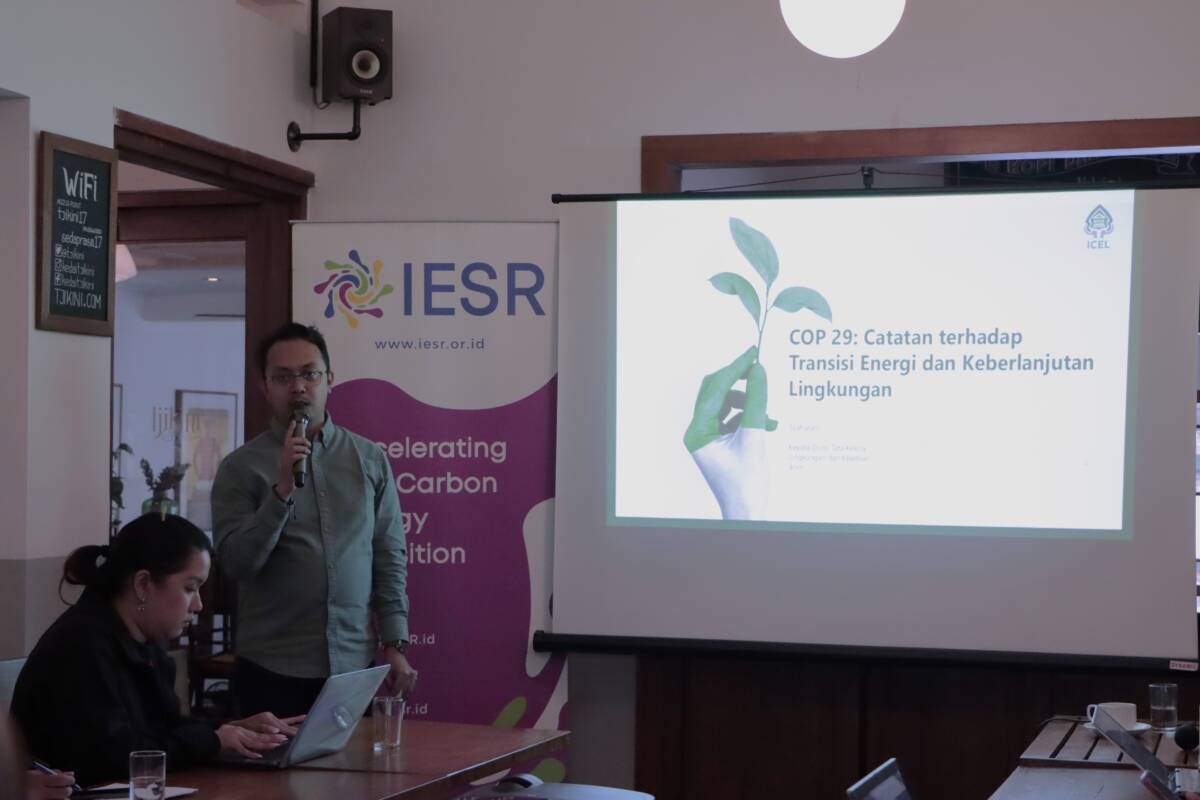Jakarta, December 3, 2024 – The 29th Conference of the Parties on Climate Change (COP-29), originally expected to be a “Climate Finance” COP to support developing countries in climate mitigation and adaptation, produced decisions that did not meet expectations. Developed countries only agreed to mobilize USD 300 billion per year in climate finance by 2035, far below the USD 1.3 trillion target proposed by developing countries. Despite trying to ensure the commitment of all parties to achieve climate finance for developing countries of USD 1.3 trillion per year by 2035, COP-29 does not require full contributions from developed countries.
Fabby Tumiwa, Executive Director of the Institute for Essential Services Reform (IESR), views that the process and outcome of COP-29 disappointed many parties and eroded trust in the multilateral process. According to him, efforts to limit the earth’s temperature to 1.5 degrees Celsius is a global problem that requires close and strong international cooperation.
“Financial support, technology transfer, and capacity building for developing countries from developed countries are important factors for improving and achieving ambitious climate crisis mitigation and adaptation actions in developing countries. COP-29 should be able to ensure the availability of adequate and effective funding for developing countries, such as Indonesia,” said Fabby.
In the COP-29 Media Briefing on Tuesday (3/12/2024), Arief Rosadi, Climate and Energy Diplomacy Program Manager, IESR, explained that in addition to funding, COP-29 also agreed on a mechanism for implementing an international carbon market through the Paris Agreement Credit Mechanism (PACM) by Article 6 of the Paris Agreement. This mechanism allows carbon trading between companies from one country and carbon credit units from other countries by meeting specific standards. In addition, the mechanism also includes mandatory safeguards for the environment and human rights that will be overseen by the United Nations (UN) (WEF, 2024). Clear rules in implementing carbon markets are expected to generate financial flows of USD 1 trillion per year by 2050 globally, according to the International Emission Trading Association (IETA) 2024 report. However, Arief emphasized the importance of taking a critical look at the effectiveness of the carbon market in reducing emissions in an accurate and significant way.
In addition to the New Collective Quantified Goal on Climate Finance (NCQG), COP-29 delivered several climate finance agreements, including Multilateral Development Banks (MDBs) totaling USD 170 billion annually by 2030, with USD 120 billion designated for low- and middle-income countries. There is also the promise that Loss and Damage Funds will be distributed by 2025, totaling more than USD 730 million.
Arief explained that Indonesia can tap into this potential funding by aligning its climate commitments with national policies that support the transition to renewable energy. He emphasized that the energy sector is Indonesia’s second-largest emitting sector after land use and forestry. To reduce emissions from the energy sector and achieve net zero emission (NZE) by 2050, a complete transition to renewable energy is required, followed by early retirement of coal-fired power plants by 2040. The commitment to early retirement of coal-fired power plants in the next 15 years has also been expressed by President Prabowo at the G20 Summit. Arief said that an investment of USD 20-40 billion annually is needed until 2050 to accelerate the energy transition.
“However, the average public investment for renewable energy is just under USD 2 billion annually in 2017-2023. By 2022, financing from the private sector will increase to IDR 26 trillion (around USD 1.7 billion),” Arief explained.
Muhammad Aulia Anis, Just Transition Program Officer, IESR, said this large funding gap requires more financing from the public and private sectors.
IESR has evaluated the Minister of Finance Regulation (PMK) No. 103/2023, which is the basis for allocating the State Budget (APBN) to support the acceleration of coal-fired power plants.
According to Aulia, although this PMK is categorized as “strong” regarding legal aspects, the governance aspects, funding sources, monitoring framework, and evaluation are still classified as “medium.” To improve the effectiveness of governance, IESR encourages the government to provide more straightforward budget guidelines and targets, increase public transparency regarding the Energy Transition Platform, strengthen the market regulatory framework, and support institutional capacity building.
Resource materials can be accessed at https://s.id/COP29-IESR01

